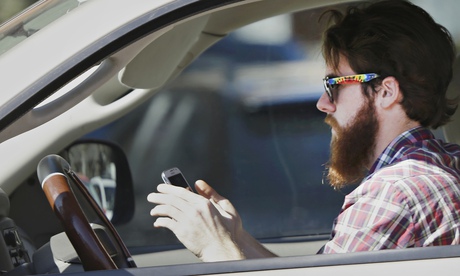
Gloucestershire’s chief constable was right to call for tougher punishments for drivers repeatedly caught using their mobile phones. Driving while using your phone creates serious risks that justify stringent state intervention – even so far as banning drivers. However, in the long term, it is clear that Suzette Davenport’s suggestion of more severe penalties is not the only, or indeed the most effective, strategy.
The argument for increasing penalties as a basis for changing people’s behaviour is, in part, based on the assumption that at the time of behaving antisocially (whether that be speeding in your car or drinking in an alcohol-free zone) people are fully aware of the potential punitive consequences and calculate accordingly.
The lawmaker has to figure out the optimum point at which the costs of a penalty outweigh the rewards of such behaviour – is the thrill of driving fast worth losing your licence, for instance?
If behavioural scientists are to be believed, however, human behaviour is rarely based on such calculations. So when our mobile phone rings while we are driving we pick it up on the basis of unthinking habit, not because of a complex risk analysis. The challenge is then trying to tackle the unthinking behaviours that inform our mobile phone use in and outside the car.
While mobile phones may appear relatively simple, they are actually complicated social technologies. Mobile phones have enabled us to develop flexible forms of working and socialising that mean our plans can be improvised at a moment’s notice. Enforcing the use of seat belts in cars was easy to the extent that it only involved a slight change in how people behave in cars. Stopping using a mobile phone in a car involves the more complex decision to cut us off from our improvisational lives and schedules. It is also important to note that historically, the mobile phone finds its point of origin in the car. Companies such as Carphone Warehouse are now among the only reminders of the days of the car phone that could only work in a car. The mobilities of the car and the phone have always been tightly interconnected and have collectively served to support the emerging freedoms of the average citizen.
Systematically reducing the use of mobile phones in cars requires that we no longer think of mobile phone use as the outcome of isolated and rational individual decision-making. We need to recognise the social norms of perpetual interconnectedness and productivity that are driving the use of smartphones in unsafe environments. We must also acknowledge the alluring pull of the phone that pings on the seat next to us as we are driving.
There is of course no easy solution to such complex interpersonal and psychological processes. Technology will undoubtedly play a part. Apple has recently taken out a patent for a new technology that is able to automatically lock people out of certain iPhone functions while they are driving. Changing social norms is also important. We already know that alerting people to the fact that most people do not use their phones while driving is likely to have a greater impact than a punitive warning. But social norms have a broader role to play, as we collectively negotiate new forms of etiquette concerning how to treat people who are driving while talking to you on their mobile, or trying to phone you while you are at the wheel. Establishing new habits, particularly around making important calls before you set out on a journey, and the use of service stations to place calls could also help.
As the number of cars and mobile phones in circulation increases, this behavioural problem is only likely to get more pronounced. Tougher penalties could play an important role in addressing this issue, but it is unlikely to be successful unless you understand why people have an urge to text while driving in the first place.

